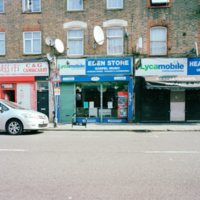
Eden Gospel
Letitia Kamayi: You Should Know Me
Artist’s Statement Kongo: You Should Know Me was my selfish way of learning more about my past, my ancestors through the images of my kinfolk. Unfortunately, the archive institutions I approached all asked for paperwork I could not supply; money I could not pay and questions I did not understand how to answer.
Only one missionary based in Ghent; the Sisters of Charity of Jesus and Mary, opened its doors and visual records to me and through them I was able to see a small percentage of the Congolese story before me. Though happy to have this access, I was not too overjoyed by everything I saw. There was a host of missing stories not recorded, stories that my family and friends families experienced. Chapters and verses missing from the identity of the Congolese narrative. Thus Kongo: You Should Know Me evolved to Kongo Archives.
Kongo Archives is extremely personal to me not merely because I am Congolese but also because there is a lot about my country I do not know and am searching for. I believe it is also something desperately needed, especially as our country’s political structure hangs in the global balance.
It’s a necessity even!
Culture; traditions; customs; language and pretty much everything has always been passed down orally through the stories in African customs, and now too many of those who did the passing down are fast passing away, taking with them all our history and rightful heritage. Taking away my rightful heritage, my story, my future and connection to a national identity.
It is a cliché to say, however Kongo Archives gives a voice to every Congolese person, travelling further than just those within the confines of the project. The archives is the stories of the past, the present and a storage unit where future stories can be placed when they become part of our inevitable past.
It [Kongo Archives] is here to topple the power structures of the single story of Congolese identity, working to reform the world’s understanding of, and have embedded notions questioned of a people whose stories and lives were second to the arrival of their colonial history and identity killers.
Bringing light to the stories which humanise the “so-called beasts from the dark continent” which continues till this day to suffer from decades of war and conflict whilst also being the wealthiest in natural minerals; culture and fight for peace one day.
Being Congolese I see our hidden presence in the “strangest” places, though this should not be a “strange” sight, this is the importance which representation brings! Change to people’s (and my own) opinions and views of those they are not well informed about. Kongo Archives will bring light to the multilayers of the Congolese people both residing in and out of The Motherland. It is important to have this representation to solidify the very absent Congolese presence outside of the Democratic Republic of Congo, in places such as London; Paris and Belgium as a positive display of unity; positive contribution and patriotism.
Kongo Archives aims to bring the Congolese heritage full circle through exposing the parts of our (Congolese) past and current state the world has and continues to fail to reveal. Breaking down the stereotypes of the poorest; “most dangerous place on earth to be a woman” to a country with a vast potential of peace; unconditional source of love and fight given the chance for change within its power structures.
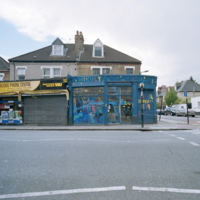
Mikuly
Letitia Kamayi: You Should Know Me
Artist’s Statement Kongo: You Should Know Me was my selfish way of learning more about my past, my ancestors through the images of my kinfolk. Unfortunately, the archive institutions I approached all asked for paperwork I could not supply; money I could not pay and questions I did not understand how to answer.
Only one missionary based in Ghent; the Sisters of Charity of Jesus and Mary, opened its doors and visual records to me and through them I was able to see a small percentage of the Congolese story before me. Though happy to have this access, I was not too overjoyed by everything I saw. There was a host of missing stories not recorded, stories that my family and friends families experienced. Chapters and verses missing from the identity of the Congolese narrative. Thus Kongo: You Should Know Me evolved to Kongo Archives.
Kongo Archives is extremely personal to me not merely because I am Congolese but also because there is a lot about my country I do not know and am searching for. I believe it is also something desperately needed, especially as our country’s political structure hangs in the global balance.
It’s a necessity even!
Culture; traditions; customs; language and pretty much everything has always been passed down orally through the stories in African customs, and now too many of those who did the passing down are fast passing away, taking with them all our history and rightful heritage. Taking away my rightful heritage, my story, my future and connection to a national identity.
It is a cliché to say, however Kongo Archives gives a voice to every Congolese person, travelling further than just those within the confines of the project. The archives is the stories of the past, the present and a storage unit where future stories can be placed when they become part of our inevitable past.
It [Kongo Archives] is here to topple the power structures of the single story of Congolese identity, working to reform the world’s understanding of, and have embedded notions questioned of a people whose stories and lives were second to the arrival of their colonial history and identity killers.
Bringing light to the stories which humanise the “so-called beasts from the dark continent” which continues till this day to suffer from decades of war and conflict whilst also being the wealthiest in natural minerals; culture and fight for peace one day.
Being Congolese I see our hidden presence in the “strangest” places, though this should not be a “strange” sight, this is the importance which representation brings! Change to people’s (and my own) opinions and views of those they are not well informed about. Kongo Archives will bring light to the multilayers of the Congolese people both residing in and out of The Motherland. It is important to have this representation to solidify the very absent Congolese presence outside of the Democratic Republic of Congo, in places such as London; Paris and Belgium as a positive display of unity; positive contribution and patriotism.
Kongo Archives aims to bring the Congolese heritage full circle through exposing the parts of our (Congolese) past and current state the world has and continues to fail to reveal. Breaking down the stereotypes of the poorest; “most dangerous place on earth to be a woman” to a country with a vast potential of peace; unconditional source of love and fight given the chance for change within its power structures.
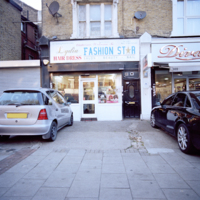
Lydia's 2 Light
Letitia Kamayi: You Should Know Me
Artist’s Statement Kongo: You Should Know Me was my selfish way of learning more about my past, my ancestors through the images of my kinfolk. Unfortunately, the archive institutions I approached all asked for paperwork I could not supply; money I could not pay and questions I did not understand how to answer.
Only one missionary based in Ghent; the Sisters of Charity of Jesus and Mary, opened its doors and visual records to me and through them I was able to see a small percentage of the Congolese story before me. Though happy to have this access, I was not too overjoyed by everything I saw. There was a host of missing stories not recorded, stories that my family and friends families experienced. Chapters and verses missing from the identity of the Congolese narrative. Thus Kongo: You Should Know Me evolved to Kongo Archives.
Kongo Archives is extremely personal to me not merely because I am Congolese but also because there is a lot about my country I do not know and am searching for. I believe it is also something desperately needed, especially as our country’s political structure hangs in the global balance.
It’s a necessity even!
Culture; traditions; customs; language and pretty much everything has always been passed down orally through the stories in African customs, and now too many of those who did the passing down are fast passing away, taking with them all our history and rightful heritage. Taking away my rightful heritage, my story, my future and connection to a national identity.
It is a cliché to say, however Kongo Archives gives a voice to every Congolese person, travelling further than just those within the confines of the project. The archives is the stories of the past, the present and a storage unit where future stories can be placed when they become part of our inevitable past.
It [Kongo Archives] is here to topple the power structures of the single story of Congolese identity, working to reform the world’s understanding of, and have embedded notions questioned of a people whose stories and lives were second to the arrival of their colonial history and identity killers.
Bringing light to the stories which humanise the “so-called beasts from the dark continent” which continues till this day to suffer from decades of war and conflict whilst also being the wealthiest in natural minerals; culture and fight for peace one day.
Being Congolese I see our hidden presence in the “strangest” places, though this should not be a “strange” sight, this is the importance which representation brings! Change to people’s (and my own) opinions and views of those they are not well informed about. Kongo Archives will bring light to the multilayers of the Congolese people both residing in and out of The Motherland. It is important to have this representation to solidify the very absent Congolese presence outside of the Democratic Republic of Congo, in places such as London; Paris and Belgium as a positive display of unity; positive contribution and patriotism.
Kongo Archives aims to bring the Congolese heritage full circle through exposing the parts of our (Congolese) past and current state the world has and continues to fail to reveal. Breaking down the stereotypes of the poorest; “most dangerous place on earth to be a woman” to a country with a vast potential of peace; unconditional source of love and fight given the chance for change within its power structures.
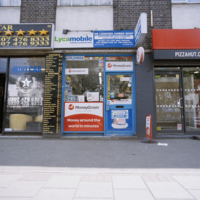
De Londres
Letitia Kamayi: You Should Know Me
Artist’s Statement Kongo: You Should Know Me was my selfish way of learning more about my past, my ancestors through the images of my kinfolk. Unfortunately, the archive institutions I approached all asked for paperwork I could not supply; money I could not pay and questions I did not understand how to answer.
Only one missionary based in Ghent; the Sisters of Charity of Jesus and Mary, opened its doors and visual records to me and through them I was able to see a small percentage of the Congolese story before me. Though happy to have this access, I was not too overjoyed by everything I saw. There was a host of missing stories not recorded, stories that my family and friends families experienced. Chapters and verses missing from the identity of the Congolese narrative. Thus Kongo: You Should Know Me evolved to Kongo Archives.
Kongo Archives is extremely personal to me not merely because I am Congolese but also because there is a lot about my country I do not know and am searching for. I believe it is also something desperately needed, especially as our country’s political structure hangs in the global balance.
It’s a necessity even!
Culture; traditions; customs; language and pretty much everything has always been passed down orally through the stories in African customs, and now too many of those who did the passing down are fast passing away, taking with them all our history and rightful heritage. Taking away my rightful heritage, my story, my future and connection to a national identity.
It is a cliché to say, however Kongo Archives gives a voice to every Congolese person, travelling further than just those within the confines of the project. The archives is the stories of the past, the present and a storage unit where future stories can be placed when they become part of our inevitable past.
It [Kongo Archives] is here to topple the power structures of the single story of Congolese identity, working to reform the world’s understanding of, and have embedded notions questioned of a people whose stories and lives were second to the arrival of their colonial history and identity killers.
Bringing light to the stories which humanise the “so-called beasts from the dark continent” which continues till this day to suffer from decades of war and conflict whilst also being the wealthiest in natural minerals; culture and fight for peace one day.
Being Congolese I see our hidden presence in the “strangest” places, though this should not be a “strange” sight, this is the importance which representation brings! Change to people’s (and my own) opinions and views of those they are not well informed about. Kongo Archives will bring light to the multilayers of the Congolese people both residing in and out of The Motherland. It is important to have this representation to solidify the very absent Congolese presence outside of the Democratic Republic of Congo, in places such as London; Paris and Belgium as a positive display of unity; positive contribution and patriotism.
Kongo Archives aims to bring the Congolese heritage full circle through exposing the parts of our (Congolese) past and current state the world has and continues to fail to reveal. Breaking down the stereotypes of the poorest; “most dangerous place on earth to be a woman” to a country with a vast potential of peace; unconditional source of love and fight given the chance for change within its power structures.
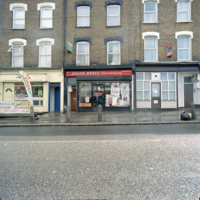
Bercy Salon
Letitia Kamaye: You Should Know Me
Artist’s Statement Kongo: You Should Know Me was my selfish way of learning more about my past, my ancestors through the images of my kinfolk. Unfortunately, the archive institutions I approached all asked for paperwork I could not supply; money I could not pay and questions I did not understand how to answer.
Only one missionary based in Ghent; the Sisters of Charity of Jesus and Mary, opened its doors and visual records to me and through them I was able to see a small percentage of the Congolese story before me. Though happy to have this access, I was not too overjoyed by everything I saw. There was a host of missing stories not recorded, stories that my family and friends families experienced. Chapters and verses missing from the identity of the Congolese narrative. Thus Kongo: You Should Know Me evolved to Kongo Archives.
Kongo Archives is extremely personal to me not merely because I am Congolese but also because there is a lot about my country I do not know and am searching for. I believe it is also something desperately needed, especially as our country’s political structure hangs in the global balance.
It’s a necessity even!
Culture; traditions; customs; language and pretty much everything has always been passed down orally through the stories in African customs, and now too many of those who did the passing down are fast passing away, taking with them all our history and rightful heritage. Taking away my rightful heritage, my story, my future and connection to a national identity.
It is a cliché to say, however Kongo Archives gives a voice to every Congolese person, travelling further than just those within the confines of the project. The archives is the stories of the past, the present and a storage unit where future stories can be placed when they become part of our inevitable past.
It [Kongo Archives] is here to topple the power structures of the single story of Congolese identity, working to reform the world’s understanding of, and have embedded notions questioned of a people whose stories and lives were second to the arrival of their colonial history and identity killers.
Bringing light to the stories which humanise the “so-called beasts from the dark continent” which continues till this day to suffer from decades of war and conflict whilst also being the wealthiest in natural minerals; culture and fight for peace one day.
Being Congolese I see our hidden presence in the “strangest” places, though this should not be a “strange” sight, this is the importance which representation brings! Change to people’s (and my own) opinions and views of those they are not well informed about. Kongo Archives will bring light to the multilayers of the Congolese people both residing in and out of The Motherland. It is important to have this representation to solidify the very absent Congolese presence outside of the Democratic Republic of Congo, in places such as London; Paris and Belgium as a positive display of unity; positive contribution and patriotism.
Kongo Archives aims to bring the Congolese heritage full circle through exposing the parts of our (Congolese) past and current state the world has and continues to fail to reveal. Breaking down the stereotypes of the poorest; “most dangerous place on earth to be a woman” to a country with a vast potential of peace; unconditional source of love and fight given the chance for change within its power structures.
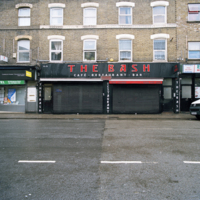
The Bash
Letitia Kamayi: You Should Know Me
Artist’s Statement Kongo: You Should Know Me was my selfish way of learning more about my past, my ancestors through the images of my kinfolk. Unfortunately, the archive institutions I approached all asked for paperwork I could not supply; money I could not pay and questions I did not understand how to answer.
Only one missionary based in Ghent; the Sisters of Charity of Jesus and Mary, opened its doors and visual records to me and through them I was able to see a small percentage of the Congolese story before me. Though happy to have this access, I was not too overjoyed by everything I saw. There was a host of missing stories not recorded, stories that my family and friends families experienced. Chapters and verses missing from the identity of the Congolese narrative. Thus Kongo: You Should Know Me evolved to Kongo Archives.
Kongo Archives is extremely personal to me not merely because I am Congolese but also because there is a lot about my country I do not know and am searching for. I believe it is also something desperately needed, especially as our country’s political structure hangs in the global balance.
It’s a necessity even!
Culture; traditions; customs; language and pretty much everything has always been passed down orally through the stories in African customs, and now too many of those who did the passing down are fast passing away, taking with them all our history and rightful heritage. Taking away my rightful heritage, my story, my future and connection to a national identity.
It is a cliché to say, however Kongo Archives gives a voice to every Congolese person, travelling further than just those within the confines of the project. The archives is the stories of the past, the present and a storage unit where future stories can be placed when they become part of our inevitable past.
It [Kongo Archives] is here to topple the power structures of the single story of Congolese identity, working to reform the world’s understanding of, and have embedded notions questioned of a people whose stories and lives were second to the arrival of their colonial history and identity killers.
Bringing light to the stories which humanise the “so-called beasts from the dark continent” which continues till this day to suffer from decades of war and conflict whilst also being the wealthiest in natural minerals; culture and fight for peace one day.
Being Congolese I see our hidden presence in the “strangest” places, though this should not be a “strange” sight, this is the importance which representation brings! Change to people’s (and my own) opinions and views of those they are not well informed about. Kongo Archives will bring light to the multilayers of the Congolese people both residing in and out of The Motherland. It is important to have this representation to solidify the very absent Congolese presence outside of the Democratic Republic of Congo, in places such as London; Paris and Belgium as a positive display of unity; positive contribution and patriotism.
Kongo Archives aims to bring the Congolese heritage full circle through exposing the parts of our (Congolese) past and current state the world has and continues to fail to reveal. Breaking down the stereotypes of the poorest; “most dangerous place on earth to be a woman” to a country with a vast potential of peace; unconditional source of love and fight given the chance for change within its power structures.
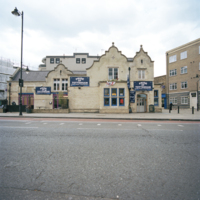
P.O.T
Letitia Kamayi: You Should Know Me
Artist’s Statement Kongo: You Should Know Me was my selfish way of learning more about my past, my ancestors through the images of my kinfolk. Unfortunately, the archive institutions I approached all asked for paperwork I could not supply; money I could not pay and questions I did not understand how to answer.
Only one missionary based in Ghent; the Sisters of Charity of Jesus and Mary, opened its doors and visual records to me and through them I was able to see a small percentage of the Congolese story before me. Though happy to have this access, I was not too overjoyed by everything I saw. There was a host of missing stories not recorded, stories that my family and friends families experienced. Chapters and verses missing from the identity of the Congolese narrative. Thus Kongo: You Should Know Me evolved to Kongo Archives.
Kongo Archives is extremely personal to me not merely because I am Congolese but also because there is a lot about my country I do not know and am searching for. I believe it is also something desperately needed, especially as our country’s political structure hangs in the global balance.
It’s a necessity even!
Culture; traditions; customs; language and pretty much everything has always been passed down orally through the stories in African customs, and now too many of those who did the passing down are fast passing away, taking with them all our history and rightful heritage. Taking away my rightful heritage, my story, my future and connection to a national identity.
It is a cliché to say, however Kongo Archives gives a voice to every Congolese person, travelling further than just those within the confines of the project. The archives is the stories of the past, the present and a storage unit where future stories can be placed when they become part of our inevitable past.
It [Kongo Archives] is here to topple the power structures of the single story of Congolese identity, working to reform the world’s understanding of, and have embedded notions questioned of a people whose stories and lives were second to the arrival of their colonial history and identity killers.
Bringing light to the stories which humanise the “so-called beasts from the dark continent” which continues till this day to suffer from decades of war and conflict whilst also being the wealthiest in natural minerals; culture and fight for peace one day.
Being Congolese I see our hidden presence in the “strangest” places, though this should not be a “strange” sight, this is the importance which representation brings! Change to people’s (and my own) opinions and views of those they are not well informed about. Kongo Archives will bring light to the multilayers of the Congolese people both residing in and out of The Motherland. It is important to have this representation to solidify the very absent Congolese presence outside of the Democratic Republic of Congo, in places such as London; Paris and Belgium as a positive display of unity; positive contribution and patriotism.
Kongo Archives aims to bring the Congolese heritage full circle through exposing the parts of our (Congolese) past and current state the world has and continues to fail to reveal. Breaking down the stereotypes of the poorest; “most dangerous place on earth to be a woman” to a country with a vast potential of peace; unconditional source of love and fight given the chance for change within its power structures.
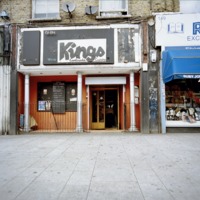
Kings
Letitia Kamayi: You Should Know Me
Artist’s Statement Kongo: You Should Know Me was my selfish way of learning more about my past, my ancestors through the images of my kinfolk. Unfortunately, the archive institutions I approached all asked for paperwork I could not supply; money I could not pay and questions I did not understand how to answer.
Only one missionary based in Ghent; the Sisters of Charity of Jesus and Mary, opened its doors and visual records to me and through them I was able to see a small percentage of the Congolese story before me. Though happy to have this access, I was not too overjoyed by everything I saw. There was a host of missing stories not recorded, stories that my family and friends families experienced. Chapters and verses missing from the identity of the Congolese narrative. Thus Kongo: You Should Know Me evolved to Kongo Archives.
Kongo Archives is extremely personal to me not merely because I am Congolese but also because there is a lot about my country I do not know and am searching for. I believe it is also something desperately needed, especially as our country’s political structure hangs in the global balance.
It’s a necessity even!
Culture; traditions; customs; language and pretty much everything has always been passed down orally through the stories in African customs, and now too many of those who did the passing down are fast passing away, taking with them all our history and rightful heritage. Taking away my rightful heritage, my story, my future and connection to a national identity.
It is a cliché to say, however Kongo Archives gives a voice to every Congolese person, travelling further than just those within the confines of the project. The archives is the stories of the past, the present and a storage unit where future stories can be placed when they become part of our inevitable past.
It [Kongo Archives] is here to topple the power structures of the single story of Congolese identity, working to reform the world’s understanding of, and have embedded notions questioned of a people whose stories and lives were second to the arrival of their colonial history and identity killers.
Bringing light to the stories which humanise the “so-called beasts from the dark continent” which continues till this day to suffer from decades of war and conflict whilst also being the wealthiest in natural minerals; culture and fight for peace one day.
Being Congolese I see our hidden presence in the “strangest” places, though this should not be a “strange” sight, this is the importance which representation brings! Change to people’s (and my own) opinions and views of those they are not well informed about. Kongo Archives will bring light to the multilayers of the Congolese people both residing in and out of The Motherland. It is important to have this representation to solidify the very absent Congolese presence outside of the Democratic Republic of Congo, in places such as London; Paris and Belgium as a positive display of unity; positive contribution and patriotism.
Kongo Archives aims to bring the Congolese heritage full circle through exposing the parts of our (Congolese) past and current state the world has and continues to fail to reveal. Breaking down the stereotypes of the poorest; “most dangerous place on earth to be a woman” to a country with a vast potential of peace; unconditional source of love and fight given the chance for change within its power structures.
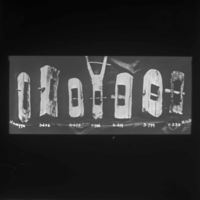
Wooden Shackles
Wooden shackles used on the coast of West Africa for securing coffles of enslaved people. This image formed part of the Harris Lantern Slide Collection. Under King Leopold II the Congo Free State used mass forced labour to extract rubber from the jungle for the European market. As consumer demand grew King Leopold II's private army - the Force Publique - used violent means to coerce the population into meeting quotas, including murder, mutilation, rape, village burning, starvation and hostage taking. Alice Seeley Harris and her husband Reverend John H. Harris were missionaries in the Congo Free State from the late 1890s. Alice produced a collection of images documenting the horrific abuses of the African rubber labourers. Her photographs are considered to be an important development in the history of humanitarian campaigning. The images were used in a number of publications. The Harrises also used the photographs to develop the Congo Atrocity Lantern Lecture which toured Britain and the the USA raising awareness of the issue of colonial abuses under King Leopold II's regime. Source: Antislavery International.
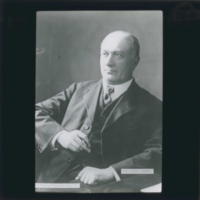
Rev. John Harris
John Harris was an English missionary, campaigner against slavery and Liberal politician. President of Anti-Slavery and Aborigines Protection Society. This image formed part of the Harris Lantern Slide Collection. Under King Leopold II the Congo Free State used mass forced labour to extract rubber from the jungle for the European market. As consumer demand grew King Leopold II's private army - the Force Publique - used violent means to coerce the population into meeting quotas, including murder, mutilation, rape, village burning, starvation and hostage taking. Alice Seeley Harris and her husband Reverend John H. Harris were missionaries in the Congo Free State from the late 1890s. Alice produced a collection of images documenting the horrific abuses of the African rubber labourers. Her photographs are considered to be an important development in the history of humanitarian campaigning. The images were used in a number of publications. The Harrises also used the photographs to develop the Congo Atrocity Lantern Lecture which toured Britain and the the USA raising awareness of the issue of colonial abuses under King Leopold II's regime. Source: Antislavery International and Panos Pictures.
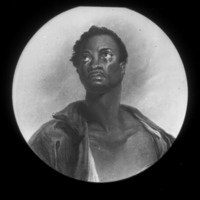
Head of a Man by John Simpson
'Head of a Man', John Simpson, oil on canvas, exhibited 1827. Currently held in the Tate Collection (Reference N00382). The image is closely associated with Simpson's subject painting 'The Capitive Slave' (1827) http://www.tate.org.uk/art/artworks/simpson-head-of-a-man-ira-frederick-aldridge-n00382 This image formed part of the Harris Lantern Slide Collection. Under King Leopold II the Congo Free State used mass forced labour to extract rubber from the jungle for the European market. As consumer demand grew King Leopold II's private army - the Force Publique - used violent means to coerce the population into meeting quotas, including murder, mutilation, rape, village burning, starvation and hostage taking. Alice Seeley Harris and her husband Reverend John H. Harris were missionaries in the Congo Free State from the late 1890s. Alice produced a collection of images documenting the horrific abuses of the African rubber labourers. Her photographs are considered to be an important development in the history of humanitarian campaigning. The images were used in a number of publications. The Harrises also used the photographs to develop the Congo Atrocity Lantern Lecture which toured Britain and the the USA raising awareness of the issue of colonial abuses under King Leopold II's regime. Source: Antislavery International and the Tate.
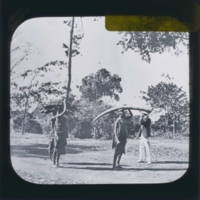
Ivory Carriers
Ivory carriers. Ivory plundered by King Leopold II's regime. This image formed part of the Harris Lantern Slide Collection. Under King Leopold II the Congo Free State used mass forced labour to extract rubber from the jungle for the European market. As consumer demand grew King Leopold II's private army - the Force Publique - used violent means to coerce the population into meeting quotas, including murder, mutilation, rape, village burning, starvation and hostage taking. Alice Seeley Harris and her husband Reverend John H. Harris were missionaries in the Congo Free State from the late 1890s. Alice produced a collection of images documenting the horrific abuses of the African rubber labourers. Her photographs are considered to be an important development in the history of humanitarian campaigning. The images were used in a number of publications. The Harrises also used the photographs to develop the Congo Atrocity Lantern Lecture which toured Britain and the the USA raising awareness of the issue of colonial abuses under King Leopold II's regime. Source: Antislavery International and Panos Pictures.
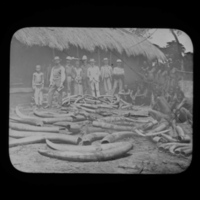
An Ivory Store
An ivory store. This image (Neg. 132) formed part of the Harris Lantern Slide Collection. This photograph formed part of the Harris Lantern Slide Collection. Under King Leopold II the Congo Free State used mass forced labour to extract rubber from the jungle for the European market. As consumer demand grew King Leopold II's private army - the Force Publique - used violent means to coerce the population into meeting quotas, including murder, mutilation, rape, village burning, starvation and hostage taking. Alice Seeley Harris and her husband Reverend John H. Harris were missionaries in the Congo Free State from the late 1890s. Alice produced a collection of images documenting the horrific abuses of the African rubber labourers. Her photographs are considered to be an important development in the history of humanitarian campaigning. The images were used in a number of publications. The Harrises also used the photographs to develop the Congo Atrocity Lantern Lecture which toured Britain and the the USA raising awareness of the issue of colonial abuses under King Leopold II's regime. Source: Antislavery International and Panos Pictures.
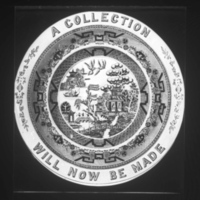
Collection Plate
Collection plate for lecture attendees to make a contribution towards the campaign. This image formed part of the Harris Lantern Slide Collection. Under King Leopold II the Congo Free State used mass forced labour to extract rubber from the jungle for the European market. As consumer demand grew King Leopold II's private army - the Force Publique - used violent means to coerce the population into meeting quotas, including murder, mutilation, rape, village burning, starvation and hostage taking. Alice Seeley Harris and her husband Reverend John H. Harris were missionaries in the Congo Free State from the late 1890s. Alice produced a collection of images documenting the horrific abuses of the African rubber labourers. Her photographs are considered to be an important development in the history of humanitarian campaigning. The images were used in a number of publications. The Harrises also used the photographs to develop the Congo Atrocity Lantern Lecture which toured Britain and the the USA raising awareness of the issue of colonial abuses under King Leopold II's regime. Source: Antislavery International.
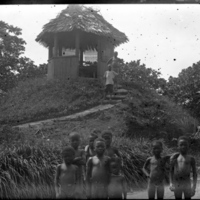
A Group of African Children
A group of African children. This image formed part of the Harris Lantern Slide Collection. Under King Leopold II the Congo Free State used mass forced labour to extract rubber from the jungle for the European market. As consumer demand grew King Leopold II's private army - the Force Publique - used violent means to coerce the population into meeting quotas, including murder, mutilation, rape, village burning, starvation and hostage taking. Alice Seeley Harris and her husband Reverend John H. Harris were missionaries in the Congo Free State from the late 1890s. Alice produced a collection of images documenting the horrific abuses of the African rubber labourers. Her photographs are considered to be an important development in the history of humanitarian campaigning. The images were used in a number of publications. The Harrises also used the photographs to develop the Congo Atrocity Lantern Lecture which toured Britain and the the USA raising awareness of the issue of colonial abuses under King Leopold II's regime. Source: Antislavery International.